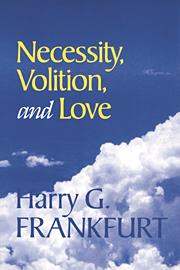Book contents
- Frontmatter
- Contents
- Preface
- Sources
- 1 The Logic of Omnipotence
- 2 Descartes's Discussion of His Existence in the Second Meditation
- 3 Descartes on the Creation of the Eternal Truths
- 4 Two Motivations for Rationalism: Descartes and Spinoza
- 5 Continuous Creation, Ontological Inertia, and the Discontinuity of Time
- 6 Concerning the Freedom and Limits of the Will
- 7 On the Usefulness of Final Ends
- 8 The Faintest Passion
- 9 On the Necessity of Ideals
- 10 On God's Creation
- 11 Autonomy, Necessity, and Love
- 12 An Alleged Asymmetry between Actions and Omissions
- 13 Equality and Respect
- 14 On Caring
1 - The Logic of Omnipotence
Published online by Cambridge University Press: 15 December 2009
- Frontmatter
- Contents
- Preface
- Sources
- 1 The Logic of Omnipotence
- 2 Descartes's Discussion of His Existence in the Second Meditation
- 3 Descartes on the Creation of the Eternal Truths
- 4 Two Motivations for Rationalism: Descartes and Spinoza
- 5 Continuous Creation, Ontological Inertia, and the Discontinuity of Time
- 6 Concerning the Freedom and Limits of the Will
- 7 On the Usefulness of Final Ends
- 8 The Faintest Passion
- 9 On the Necessity of Ideals
- 10 On God's Creation
- 11 Autonomy, Necessity, and Love
- 12 An Alleged Asymmetry between Actions and Omissions
- 13 Equality and Respect
- 14 On Caring
Summary
George Mavrodes has recently presented an analysis designed to show that, despite some appearances to the contrary, a certain well-known puzzle actually raises no serious difficulties in the notion of divine omnipotence. The puzzle suggests a test of God's power – can He create a stone too heavy for Him to lift? – which, it seems, cannot fail to reveal that His power is limited. For He must, it would appear, either show His limitations by being unable to create such a stone or by being unable to lift it once He had created it.
In dealing with this puzzle, Mavrodes points out that it involves the setting of a task whose description is self-contradictory – the task of creating a stone too heavy for an omnipotent being to lift. He calls such tasks “pseudo-tasks” and he says of them: “Such pseudo-tasks, not falling within the realm of possibility, are not objects of power at all. Hence the fact that they cannot be performed implies no limit on the power of God, and hence no defect in the doctrine of omnipotence.” Thus his way of dealing with the puzzle relies upon the principle that an omnipotent being need not be supposed capable of performing tasks whose descriptions are self-contradictory.
Now this principle is one that Mavrodes apparently regards as self-evident, since he offers no support for it whatever except some references which indicate that it was also accepted by Saint Thomas Aquinas.
- Type
- Chapter
- Information
- Necessity, Volition, and Love , pp. 1 - 2Publisher: Cambridge University PressPrint publication year: 1998



